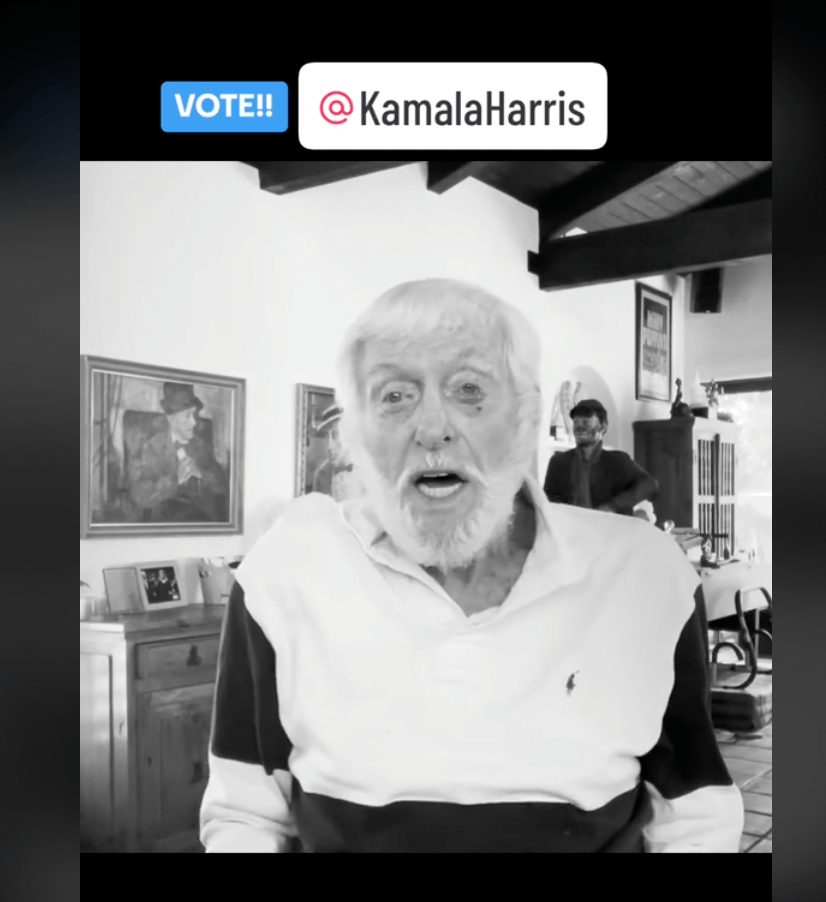Quoting Rod Serling — and, sort of, the bible — Dick Van Dyke endorses Harris
‘Hatred is not the norm, prejudice is not the norm; suspicion, dislike, jealousy, scapegoating, none of those are the transcendent facet of the human personality.’

Dick Van Dyke, reading the words of Rod Serling, warns against prejudice and scapegoating. Photo by TikTok screenshot
Dick Van Dyke, the 98-year-old film and TV icon, took to TikTok on election eve to endorse Kamala Harris, with words from Rod Serling — and, in a way, the book of Exodus.
Van Dyke said that he had recently pulled out a speech he delivered on May 31, 1964, alongside the Rev. Martin Luther King, Jr. at the Coliseum in Los Angeles, California. He read a selection of the text written by Serling, creator of The Twilight Zone, that called to reject prejudice and to welcome the stranger.
“Hatred is not the norm, prejudice is not the norm; suspicion, dislike, jealousy, scapegoating, none of those are the transcendent facet of the human personality,” Van Dyke read. “They’re cancers of the soul. They are the infectious and contagious viruses that have been breeding humanity for years, and because they have been and because they are, is it necessary that they shall be? I think not.”
@mrvandyke @Kamala Harris @Kamala HQ @💙 Harris-Walz2024💙 ♬ original sound - Dick Van Dyke
Serling, who was born to a Jewish family in Syracuse, New York and raised in Binghamton where they were involved with the Jewish Community Center, went on to allude to a command expressed in Exodus 23:9, “You shall not oppress a stranger, for you know the feelings of the stranger, having yourselves been strangers in the land of Egypt.”
“If there’s one voice left to say, ‘Welcome’ to a stranger, if there’s one hand outstretched to say ‘Enter’ and ‘Share,’ if there’s one mind remaining to think of thought of warmth and friendship, then there’s a future in which we’ll find more than one hand, more than one voice and more than one mind dedicated to the cause of man’s equality,” Van Dyke read.
Serling, who also narrated each episode of The Twilight Zone, an anthology series whose eerie allegories took on facism, racial prejudice and McCarthyism, often to the chagrin of network censors, was an active proponent of civil rights who converted to Unitarianism when he was in college. (His daughter Anne wrote in her book As I Knew Him: My Dad, Rod Serling that he didn’t, as many suspect, convert to marry his wife, but he found the lessons taught at the Unitarian Church to be “intellectually open-minded.”)
Anne Serling wrote to me, in a 2019 email for the 60th anniversary of The Twilight Zone that her father
“was fiercely proud of his heritage and although he grew up in a Reform Jewish family, certain traditions remained with him throughout his life,” like lighting a Yahrzeit candle for his parents.
His message that day in 1964, delivered by Van Dyke to a crowd of 60,000, was that while human beings are disposed to violence and the “ugly echo of intolerance,” those features are but “clinging vestiges of a detained past, not the harbingers of a better, cleaner future.”
In other words, the arc of the moral universe can bend toward justice, if we put in the work.
“1964,” Van Dyke concluded. “A lot’s happened, not so much as Martin Luther dreamed, but it’s a start.”
These remarks brought to mind the Twilight Zone anniversary article, and a conversation I had with Serling’s daughter Anne.
“My father would be deeply saddened by the resurgence of white nationalists and by what is happening in the world today,” she said in an email. She might like Van Dyke’s endorsement.
A message from our CEO & publisher Rachel Fishman Feddersen
I hope you appreciated this article. Before you go, I’d like to ask you to please support the Forward’s award-winning, nonprofit journalism during this critical time.
We’ve set a goal to raise $260,000 by December 31. That’s an ambitious goal, but one that will give us the resources we need to invest in the high quality news, opinion, analysis and cultural coverage that isn’t available anywhere else.
If you feel inspired to make an impact, now is the time to give something back. Join us as a member at your most generous level.
— Rachel Fishman Feddersen, Publisher and CEO